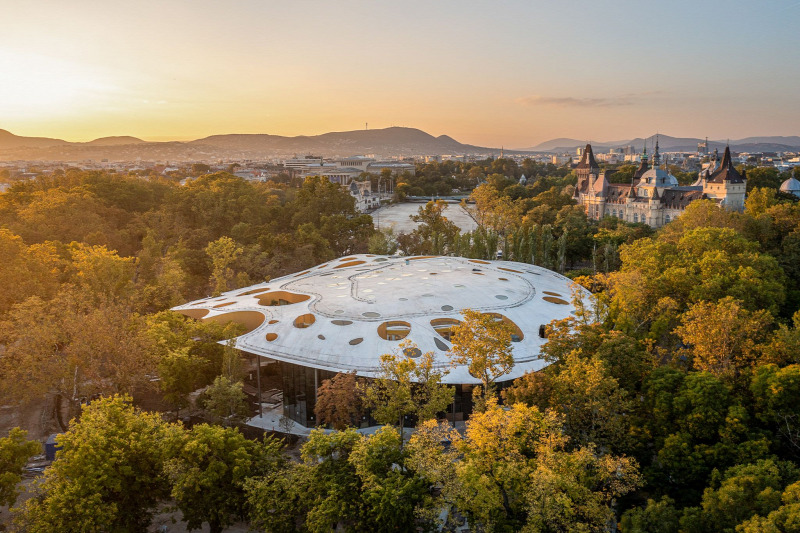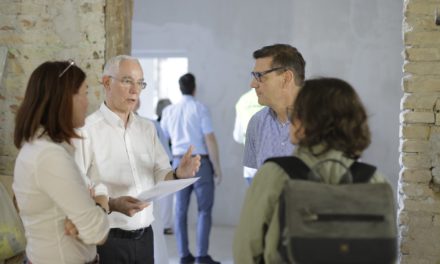As our readers know, the ambitious undertaking of the historian Ferenc Bánhegyi is to present the eras, important events and notable figures of Hungarian history in chronological order. First of all, he wants to "initiate" those young people into the great moments of our history, to introduce them to our great eras, whose historical knowledge is at best limited to the school curriculum - or not even that.
The 51st part of the series is different from the previous ones, we can read an exceptionally personal analysis of how our recent history was and continues to be, why our country is "out of line" and what can we hope for in the shadow of the war going on in our neighborhood?
"Happy peace times
Which generation is this? Many people asked me when I mentioned this during lectures, debates and discussions. Of course, I am thinking of those born in the first half of the 1950s, including myself. After all, this age group - those who have lived through it - are approaching their seventieth year, or have already reached it.
Why did you live in peace? Because there was no war on Hungarian territory in our lifetime. We lived the first almost four decades of our lives in such a way that we were able to experience the one-sided, communist world of the Rákosi and Kádár regimes. It is true that during these decades the vast majority of the country's population was left out of earthly good, but at least there was peace in the motherland.
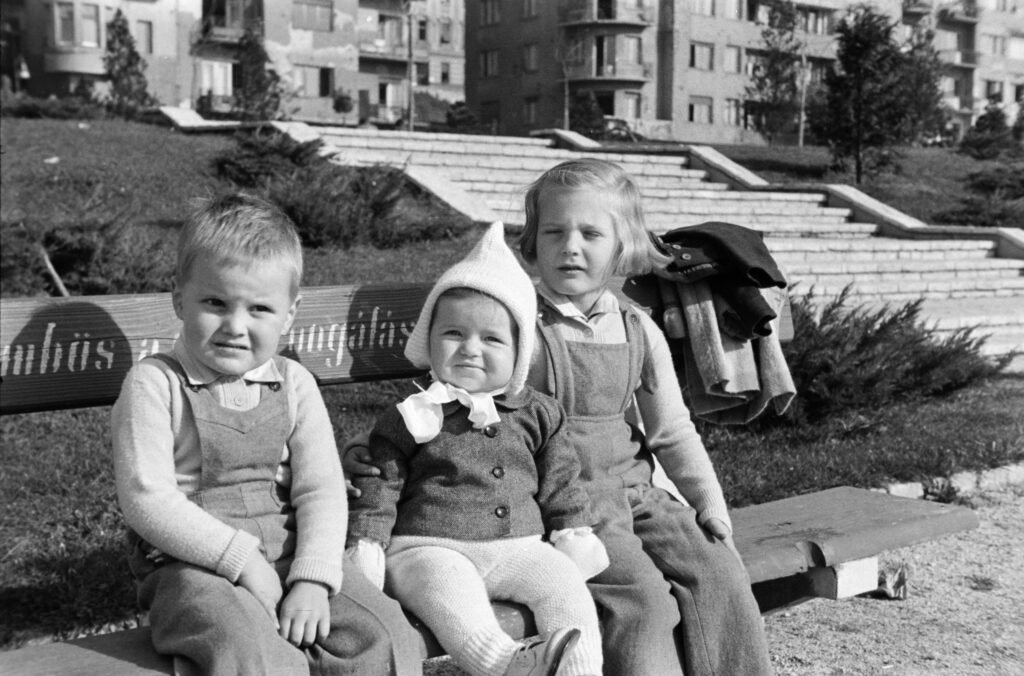
Children of the Future from 1953 (photo: Fortepan)
Why don't I think that I should classify those born ten years earlier as the peaceful generation? Because they were born in the last years of the Second World War, because they still experienced the poverty and deprivation that characterized the second half of the forties. Not to mention that very few of them are alive in today's dire years.
Let's not forget that this generation was already alive in 1956, but what did a three- or four-year-old child experience and understand from the events of the revolution and the war of independence? Especially a little Hungarian growing up in the countryside, in a village? It was different in Budapest and in the cities affected by the fire. There, if a small child lost his father, brother, close relative, neighbor, the words of the guns and the faces of the murderers were already burned into that human seedling. Despite this, ours is a lucky generation for the most part. We went to school, got a job, started a family, and so on, but we prospered. What's more, we even experienced the state of grace in which we were able to change the system in 1990. Then it turned out that it was only possible to change the method. After all
here are also the beneficiaries of the Kádár system. They, our contemporaries and their descendants, who are also in their seventies, are still at the forefront of power and wealth. They are the ones who became the beneficiaries of this system change.Let's not be unfair, there were quite a few new beneficiaries.
Which is the point! In the first half of their lives, our age group experienced the communist world, socialist democracy, and in the second half, the so-called western democracy that they so much desired. But what will be the end of this is the big question of our days. Because
Seventy years! This is a good age. I think about this especially when I visit the cemetery of my native village, where the graves of my former classmates and schoolmates form a row.
Bitter decades
Think about the conditions under which a Hungarian born in 1900 lived for the same amount of time, i.e. seventy years! As a small child, he lived through the last years of the "happy times of peace", he was still a citizen of the Austro-Hungarian Monarchy. Of course, it does not matter whether he was born in a well-to-do family of intellectuals or citizens in the capital, or in a peasant family in the village. The former could still experience the experience that if he boarded the train in Keleti with his family, he could travel to Fiume or Opatija on the coast, or to famous spas such as Herkulesfürdő, and Borszék, which is a thousand kilometers from Budapest, without any border crossing, currency exchange, or language anomalies. If the train took the family to Brasó, Marosvásárhely, Cluj, or one of the other hundreds of magical towns in Transylvania, they still stayed within the thousand-year-old national borders.
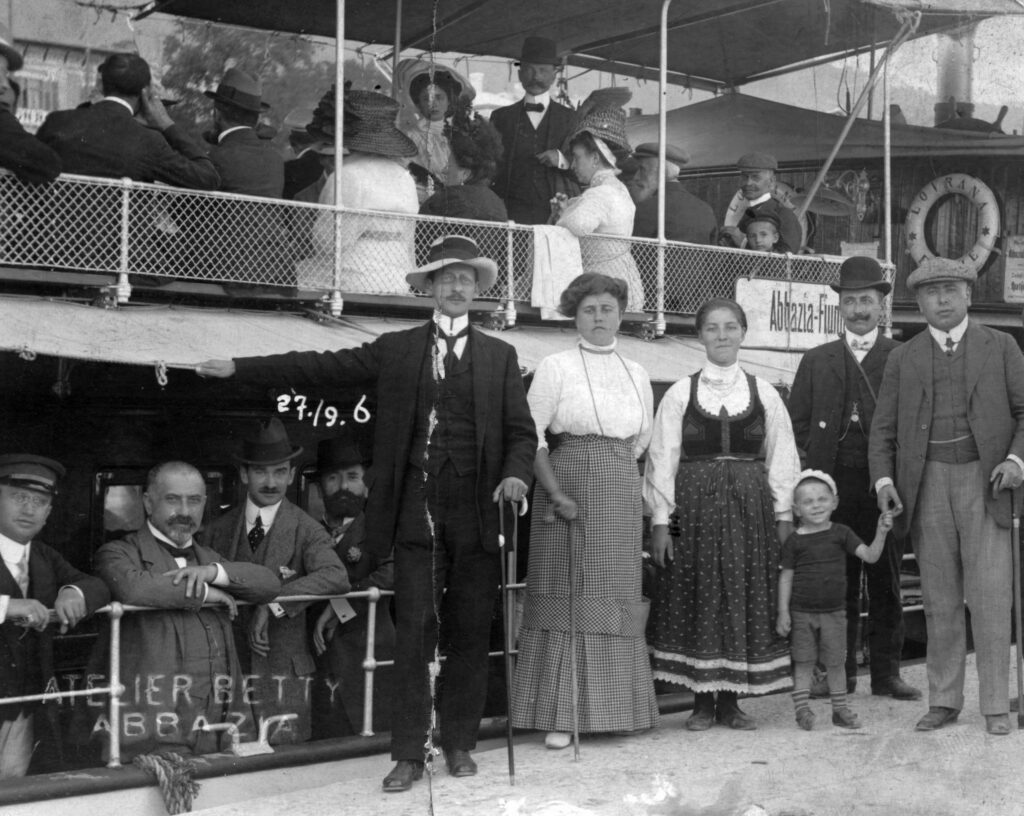
Voyage to Abbázia 1906 (photo: Fortepan)
In the same way, the teenager could travel to Munkács, Verecké, Kassa, Tátralomnic, Nitra and Bratislava, even then he did not
need a passport. The endless list could be continued with Délvidék and Őrvidék, but this is not the goal now.
The same youth was fourteen years old when the Great War broke out. Whether you lived in a city or a village, sooner or later you experienced the tragedy that befell our country. (It should be noted that 1867, 47 years since the agreement, passed in peace, in the midst of large constructions and country-shaping works, and then the war broke out.
the political situation at that time was eerily similar to today. The rhetoric of war ran full steam throughout Europe. However, it should be known that Hungary alone did not want to join the warring parties. All the other belligerent powers had already decided to go to war!Let's recall the resistance of István Tisza, who was eventually forced into the world together with the country. The result was that our country was accused of starting the war, and Hungary paid the biggest price. Nothing new under the sun!)
However, let's return to the young man born in 1900. How did he feel when he lost his father, older brothers and relatives? Although there was no war in Hungary, with the exception of the Romanian invasion in 1916, all Hungarians suffered the consequences of the devastating war. At the age of eighteen, which is one of the most beautiful years of youth and the defining year of one's life, he experienced the consequences of the war's horrors. After the lost war, however, we had to experience the rule of the Károlyi government, which also destroyed hope and ruined our country for good, and then the red terror led by Béla Kun. At the age of twenty, these young people experienced the greatest tragedy of the thousand-year-old Hungary, the infinitely unjust Trianon peace decree.
There were those for whom the Horthy era meant the dark years, but there were even more who could finally live in peace and safety in the remaining motherland.
The young man who came under Romanian, Czech, and Serbian rule experienced the hell of hells. The first decision in Vienna in 1938 was a huge satisfaction for the masses, which resulted in the beginning of the resurrection of Hungary and the return of a part of the Highlands to Hungary. The nearly forty-year-old Hungarian continued to live the hope that in 1939, a part of Transcarpathia once again belonged to the Hungarians. In 1940, new masses were able to rejoice at the second Vienna decision, since a part of Transylvania also returned to the motherland. The citizen, born in 1900, had already reached his fortieth year, when in 1941 part of the Southern Region once again belonged to Hungary.
It is worth using the events of the early 1940s as a lesson. When Hitler invaded Poland in 1939, World War II broke out. Devastating clashes took place just two hundred kilometers north of Budapest. In Hungary, however, everything took place in the usual peaceful way. Cinemas and theaters were open, people went to coffee houses and pubs, went to church on Sundays, and went to work on weekdays. Yet the war took place beyond the Carpathians, one could say, within easy reach.
The first worrying news reached the country in 1942, when the 2nd Hungarian Army joined the war against the Soviet Union.
The wealth of the forty-year-old age group that was taken as a soldier was lost, or if it returned home, there was no thanks either. , born in 1900 , was forty-five years old when the country collapsed again at the crossroads of life. In 1947, the second Trianon was forced upon us again in Paris. The Hungarian citizen born in 1900 has already experienced two world wars, two revolutions, Trianon, annexations and re-annexations of parts of the country. Perhaps the forty-five-year-old Hungarian, who initially became a citizen of the Monarchy, then of Trianon Hungary, and at the age of fifty became a comrade of the Hungarian People's Republic (1949-1989) did not even move from his place of birth. He experienced the Great War, Károlyi, Béla Kun, Trianon. Then he was able to live in the Horthy era, and if that happened, he became a Czech, Romanian, Serbian and Austrian citizen, and then Hungarian again. He lived through the Second World War, visited the hell of hells on the fronts, including the concentration camps. Then the Rákosi era, a communist-socialist world wildly alien to the soul, faith, and world view of the Hungarian people, came crashing down on him. He lived or struggled in this, but there were many who lived well. It is true, they had to deny their faith and national consciousness for this.
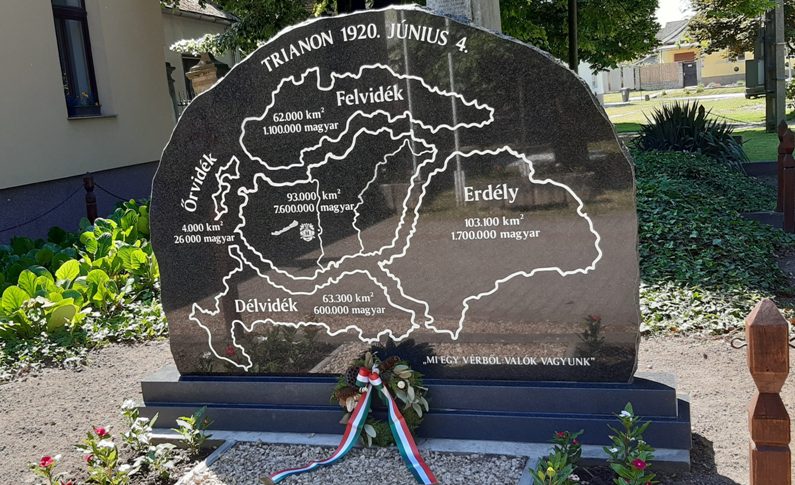
Trianon monument (photo: madocsa.hu)
The revolution and freedom struggle of 1956 meant a great change and a great tragedy for the Hungarian in his mid-fifties. Two hundred thousand of our compatriots fled the land of their ancestors. Many of those born in 1900 were also forced to leave Hungary. Not everyone wanted to go through the seventh "regime change". But even if he stayed at home out of a desire for adventure and reached his sixties, he wasn't bored either. He may have been deprived of his land and all his possessions at that time, as the concentration of tea, which destroyed the Hungarian peasant, was in full swing. Many people, the "enemies" of the system, were left without work as a punishment - just because they did not applaud the socialist "successes" - and experienced all the humiliation of the socialist deficit economy in fear, poverty, blackmail, and in the midst of deprivation. It was natural that they longed for the rich, enviable standard of living in the West.
Then, when the child of the turn of the century turned seventy, he no longer had any illusions.
After so many trials, so many struggles, so much work and disappointment, he saw the meaning of his life only in the fact that at least his descendants, his family, the country in which he spent seventy years could live in peace. (The writer of these lines graduated from high school in 1970 and was able to enter the gates of big plans.)
Nothing new under the sun
Every citizen of today's Hungary should think about the above historical example from the middle of the 20th century. There is still peace here in 2023, theaters, cinemas, museums, restaurants, coffee houses and pubs are open. And a devastating war has been raging in our neighborhood for a year now. More and more people - among them the "greats" shaping world politics - are envisioning another world war. The ordinary citizen cannot imagine this! Just as the Hungarian citizens living in the first years of the 1940s could not imagine that within a year or two their lives would change radically, and that they would take a turn for the worst.
The world is in pain! Something has to be born, and what most of us think about, we push it away from us. That can't be - every sane person thinks to themselves - because the young people are here, our children, our grandchildren! We do not believe that the tragedy will happen again, since we are members of the generation that lived in peace. We think to ourselves that the Cold War, which we have already experienced, would probably be better than the destructive killing that destroys everything.
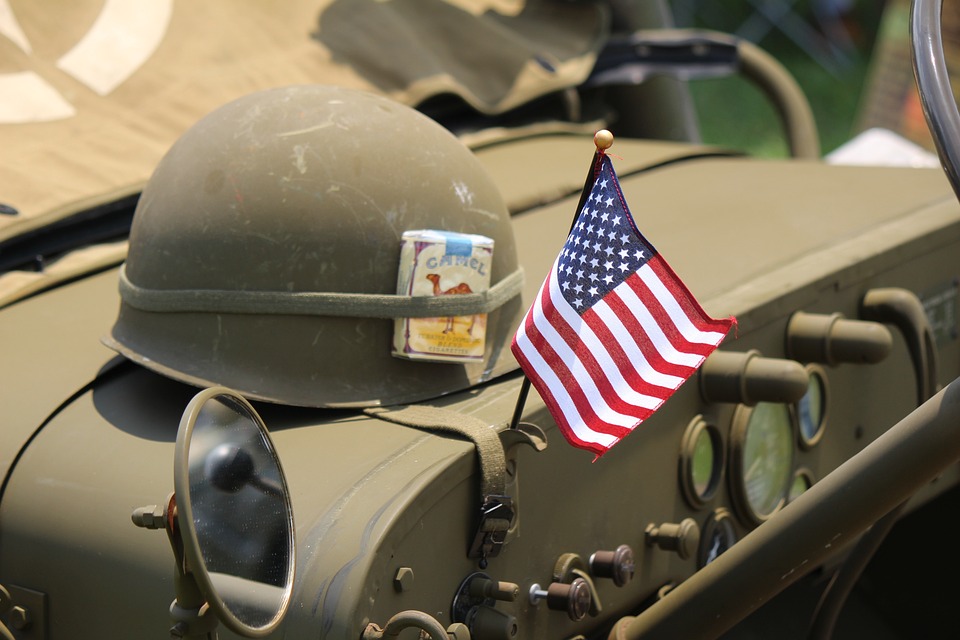
Image: Mandiner
What am I talking about? After the Second World War, it did not take long for weapons to once again take over the "solution" of conflicts between people and peoples. Such was the war in Korea (1950-1953). It should be noted that the members of the peace generation were born in these years. But it was far from Europe, blood didn't flow here. The Cold War was the result of the Korean armistice concluded in 1953 (peace between the two Koreas has not been established since then). The USA and the Soviet Union were behind the three-year country-torn war that took place in Asia. Then there was Vietnam (1965-1973), then Afghanistan (1979-1989), then (2001-2021), then the South Slavic War (1991-2001), then Iraq (2003-2011), then Libya (February 2011- October), then (2014-2020), there was Syria (2011- still ongoing) and now there is Ukraine.
With the exception of the first Afghan war, which was initiated by the Soviets, all the rest are drying up on the soul of the United States. Including the Ukrainian-Russian clash.Weapons play a role in Europe again. Behind the listed wars, in each case, the USA and the Soviet Union /Russia/ stood against each other, using and sacrificing the citizens, soldiers, territory, and economy of the countries involved in the war.
After this, the question arises, are we really a generation of peace? Yes, that was our feeling, since, with the exception of the South Slavic war, these clashes took place far away. However, the country-torn Ukrainian-Russian war is now taking place in Europe, and maybe after three years a truce will be concluded. And the cold war will develop between the USA and China. However, we seventy-year-olds feel the freezing cold of the freezing winds in Europe as well. This is not how we planned our retirement years.
We're out of line
Hungary is a miracle in the eyes of the outside world. Anyone who knows about this small country at all, and if they do, they should also know what this small country is saying to the globalist world. The fact that a stranger does not know our history and destiny cannot be blamed on him. We don't know the history of Venezuela or Nigeria either. A Hungarian, a citizen living here, should know. Because then maybe there wouldn't be this horrible division between Hungarians and "Hungarians". But he may know her, and this is the most painful thing, that he still denies it. He refuses because the indisputable facts of our one thousand one hundred year history do not fit into his world view. Because only the foreigner is beautiful, things only go smoothly elsewhere, nothing really works here.
When I hear that: "You can't live in this country..." I am filled with deep sadness. In comparison, the spas, restaurants, plazas, theaters, hiking spots, highways, entertainment venues are packed... I know, not all Hungarians can afford this.
People from other worlds do not need to know that the Carpathian Basin is the cradle of the Eurasian region. Although it wouldn't hurt them to know that! (I note that most of the peoples of Asia know this, and even know more about the origins of the Hungarians and their role over thousands of years than we do.) They also do not need to know what happened in the Battle of Bratislava in 907, and why Saint Stephen became the the only apostolic king of Christian Europe, a title even Francis Joseph bore. It is not obligatory for them to know the deeds of Saint László, his human and sovereign greatness, nor II. András and IV. Béla's measures of European importance. However, the national defense wars of János Hunyadi, King Matthias, the heroes of Végvár, the Zrínians, Ferenc Rákóczi and Lajos Kossuth, and our freedom struggles, went beyond the Carpathian mountains. However, these only reinforced in the minds of the peoples of the outside world that
Hungarians are a restless people who never give up, who don't want to fall in line.The historical fact of "we were always left to ourselves" was no accident either in the past or in the present day. The Indo-European, including the Slavic peoples (language families) never accepted us Hungarians. Over the centuries, they have launched armed and ideological attacks against us on numerous occasions. One of the fatal results of this was Trianon, and also that in the two world wars, in our 20th century revolutions, we were always on the losing side. The unjust slanders that constantly force our country to defend itself and are inflicted on our people can still be seen in the act today, in fact, they have intensified again.
We observe with wide-open eyes how it is that a crude form of Marxism started its political journey from the "model state of freedom", the United States, at the beginning of the 21st century.A Hungarian youth in his thirties knows nothing about the horrors of the 20th century, let alone a young Hungarian in his twenties. They can be won over to any ideology, it's just a matter of media and money. Why can it be won? Because parents and grandparents no longer tell them about their own lives and family experiences. They told us more! There was time and demand for it, and TV did not occupy the role of the head of the family. In contrast, the world of the Internet pours information on young people to such an extent that it almost buries them. Let's not forget the words of Sándor Márai:
"Communism has failed, in every sense, but it will be difficult to get rid of communists, because no one is as bloodthirsty as the beneficiary of a failed idea, who protects not so much the idea, but the booty, under the banner of a failed password."Just for the record, let's note that Marx and Engels published the Communist Manifesto on February 26, 1848. 175 years ago.
The division that weighs not only on us, but on most Western democracies, can be explained in many ways. Imre Madách's idea, also formulated 175 years ago, expresses the truth inherent in man much more authentically and comprehensibly than the never-realizable idea of communism.
"Don't you know that the world is happy for those who are happy and sad for those who are unhappy?"
The problem is that the material world, the GDP-based thinking, dominates the Hungarian thinking. This can happen because over time we have forgotten the well-worn and strong principles of Hungarian consciousness. However, this knowledge has become accessible again in recent decades, and more and more people are getting to know and accept it, more and more people believe, but still not enough. And the secret of our survival lies in this. However, it takes masses to change the worldview.
What am I talking about? About those symbols, that cultural treasure that can perhaps be discovered in other nations, but is offered to the Hungarians on a generous platter. These are the Tree of Life, the Miraculous Deer, the Turul, táltoshit and knowledge, the double cross, the triple pile, (the trinity can be found everywhere, for example in the three colors of our national flag), the Holy Crown, runic writing, the bow-stringing people, the hussars. (It should be noted that the listed concepts are not only a guiding principle in the Carpathian Basin.) The Hungarian language is the treasure that has undergone the least change among the languages of the world over the millennia. Like a diamond, so beautiful and unassailable.
They say it is one of the basic languages of the world.
Pentatonic folk music dominates Asia. In Japan and China, for example, Hungarian folk music is extremely popular and attracts an understanding audience. Our treasure of folk tales and folk songs is one of the richest in the world. In any case, it has no equal in Europe. Hungarian folk traditions survived until the 19th century, i.e. they are in tangible proximity. The point is, our life-centered life principle, which exists, we just need to reach out for it - although this is not trendy today - it could replace material-based thinking. And this could create a real, uplifting community. The people who can do this create the civilization of body, soul and spirit. (See the Madách quote written above!)
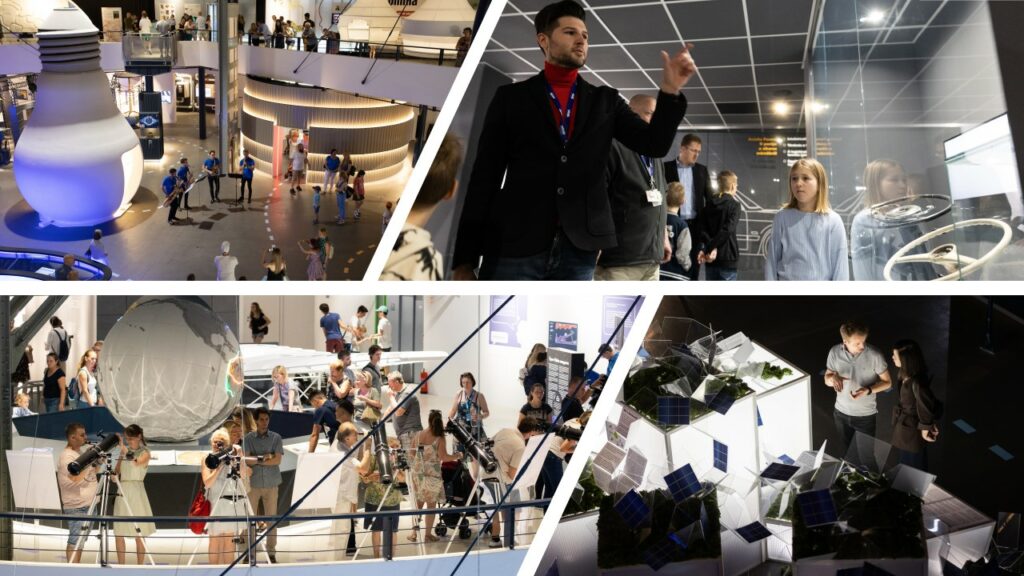
20 Dreamers of Dreams exhibition (Photo: Milennaris)
Anyone who reads these, even if they are my contemporaries, just smiles at it, because in this crazy world it's just a dream.
It is true that today's so-called Western "culture" - which throws the wonderful European works in the trash - is a nightmare.
If it's a dream and science and culture, maybe all is not lost. After all, in February 2023, the Álmok Álmodoi 20 world-class exhibition closed at Millenár, which presented 600 Hungarian inventors on 6,000 m2. The sight was amazing even for those who thought they knew everything about numerous world-famous Hungarian scientists and inventors. Among the many thousands of visitors, there wasn't a person there - be it a young student or an elderly person - whose heart wasn't filled with Hungarian pride. I don't want to exaggerate, but I can think of countless other world-class sights that have enriched Hungary in recent years. The House of Hungarian Music in Városliget, the Museum of Ethnography, the Buda Castle and about 160 spas and spas in the motherland, to which foreigners who are increasingly curious about our country line up.
I don't want to miss the admonition of the much-quoted Padre Pio, which strongly affects our topic. In Budapest, the XI. Since 2018, a statue of Padre Pio (1887-1968) has been standing in Gazdagrét in the district. This indicates that the life-size statue came out of the church interiors and the pages of the books into the public square of the city. (Would the statue still be erected in this place today?) The well-known quote reads:
"Hungary is a cage from which another beautiful bird will fly out one day. Much suffering still awaits them, but they will share in unparalleled glory throughout Europe. I envy the Hungarians, because they will bring great happiness to humanity. Few nations have such a powerful guardian angel as the Hungarians, and it would be right for them to ask more strongly for his effective protection for their country!"
won the grand prize at the Paris World Exhibition in 1900, comes to mind Good old days!
The Dalai Lama said and sent a message to the Hungarians:
“…Through all this, the opportunity comes for you to develop your abilities and show your spirit to the world. ...Think in terms of horizons! That's my advice!”The high priests of Nepal sent similar thoughts to the Hungarian people:
"Now the Earth is in labor and the future is being born in the Carpathian basin."The life-size statue of the dreamer of Peace and World Peace, the initiator of the World Peace Run (Sri Chinmoy), has been standing on the Stepping Stone since 2014. Many believe these sentences, many just want to believe in them, and many find them ridiculous.
This is where we arrived at the age of seventy. We are worried about whether a new world will come after the systems that have lived in relative peace until now, or will we return to the old ways? According to well-informed people, we are moving rapidly towards the global world. However, those of us who from our childhood can still smell the smell of freshly cut hay, the sight of cows, lambs, pigs, and horses galloping home in the evening, the sound of poultry, do not want the global world. But we also know that peaceful life cannot return in that form. We could even agree to this, just let there be peace. What can we do other than to quote again Madách, the tragedy of Man:
"I said man: fight by fighting and trust by trusting."
Author: historian Ferenc Bánhegyi
(Cover image: House of Hungarian Music/Source: Városliget Zrt.)
The parts of the series published so far can be read again here: 1., 2., 3., 4., 5., 6., 7., 8., 9., 10., 11., 12., 13., 14., 15., 16., 17., 18., 19., 20., 21., 22., 23., 24,, 25., 26., 27., 28., 29/1.,29/2., 30., 31., 32., 33., 34., 35., 36., 37., 38., 39., 40., 41., 42., 43., 44., 45., 46., 47., 48., 49., 50.

